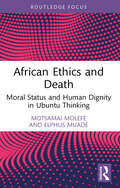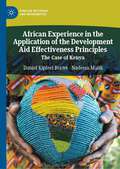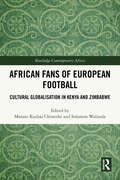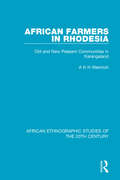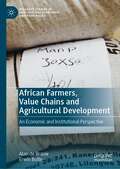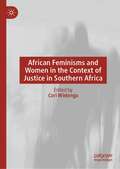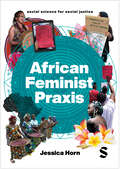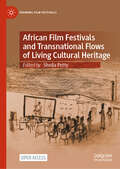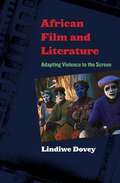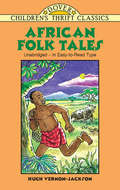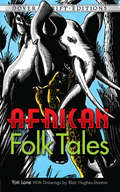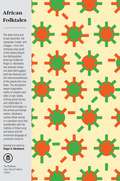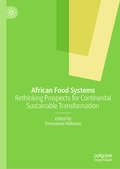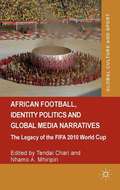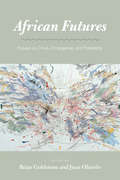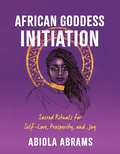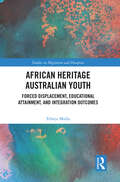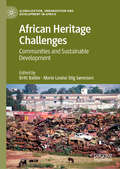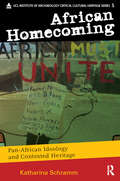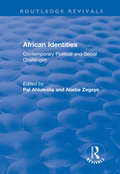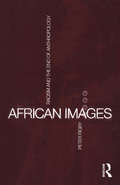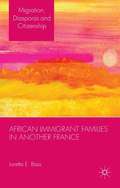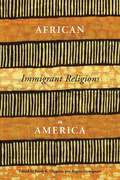- Table View
- List View
African Ethics and Death: Moral Status and Human Dignity in Ubuntu Thinking (Routledge Studies in African Philosophy)
by Motsamai Molefe Elphus MuadeThis book analyzes the concepts of moral status and human dignity in African philosophy and applies them to the moral problems associated with death. The book first challenges the criticism and rejection of moral status in African philosophy and then continues to consider how moral personhood is defined in African ethical theories, investigating which entities have full moral status or moral personhood and are therefore worthy of full ethical consideration. It then applies this theory to the problems associated with death. In the medical context, will an African theory of moral status permit or forbid euthanasia? Do we have moral obligations towards dead human bodies? Overall, the book provides an important African axiological contribution to debates on global ethics and moral philosophy. Providing an important overview of the ethical problems associated with the biological fact of death, this book will be of interest to researchers across the fields of philosophy and African studies.
African Experience in the Application of the Development Aid Effectiveness Principles: The Case of Kenya (African Histories and Modernities)
by Nadeem Malik Daniel Kipleel BorterThis book analyses the diffusion and implementation of Aid Effectiveness Principles in Kenya’s agricultural sector. Although Aid Effectiveness Principles represent a significant step in aid and development discourse, studies on its implementation remain inadequate, especially in the African context. This book combines the perspectives of the Kenyan government, donor representatives and small-scale farmers. The discussion on Kenya brings in comparative perspectives and, therefore, would have broader relevance to the African region, in general. It highlights a disconnect between the government and farmers concerning the ownership concept, where farmers lack a voice in important policy matters. The book shows that donors have exploited the weaknesses in government responses to interpret The Principles in ways that suit their strategic interests. Consequently, the book argues that the diffusion of Aid Effectiveness Principles has taken the form of symbolic imitation – a form of policy diffusion where the policymakers choose policies for their symbolic value rather than their effectiveness.
African Fans of European Football: Cultural Globalisation in Kenya and Zimbabwe (Routledge Contemporary Africa)
by Manase Kudzai Chiweshe Solomon WaliaulaThis book examines the increasing influence of European football in African societies, considering the processes and significance of being a fan and what this means for the wider globalisation of popular culture.Focussing on fan cultures in Kenya and Zimbabwe, the book argues that instead of manifestations of neo-colonialism, African fandoms of European football are practised in ways that resonate with and help reconstruct and perform the socio-cultural substance of the African communities in question. European football is therefore instrumentalised to help define the identities of the members of the fandom communities and articulate their experience of their reality in their immediate circumstances.This book reflects how the global and local can coalesce in cultural trends such as football fandom. It will interest sports, leisure, popular culture, and social anthropology researchers in Africa and beyond.
African Farmers in Rhodesia: Old and New Peasant Communities in Karangaland
by A K WeinrichOriginally published in 1975 this book analyses the factors making for success and failure in agricultural development among black Zimbabweans during the 20th century. A detailed analysis is given of 2 tribal trust lands, including government policies and administrative control of these areas, voluntary and forced adjustment to land shortage and the economic resources and productivity of peasant cultivators. Settlements under individual land tenure are examined, as are government policies to these, the internal transofrmation of these communities and their economic resources and productivity. There is also a section on irrigation schemes and the reaction of people to irrigation farming. This is an indispensable book in understanding the present-day situation of agriculture in Zimbabwe.
African Farmers, Value Chains and Agricultural Development: An Economic and Institutional Perspective (Palgrave Studies in Agricultural Economics and Food Policy)
by Erwin Bulte Alan de BrauwThis book provides a thorough introduction to and examination of agricultural value chains in Sub-Saharan Africa. First, the authors introduce the economic theory of agri-food value chains and value chain governance, focusing on domestic and regional trade in (and consumption of) food crops in a low-income country context. In addition to mainstream and heterodox thinking about value chain development, the book pays attention to political economy considerations. The book also reviews the empirical evidence on value chain development and performance in Africa. It adopts multiple lenses to examine agricultural value chains, zooming out from the micro level (e.g., relational contracting in a context of market imperfections) to the meso level (e.g., distributional implications of various value chain interventions, inclusion of specific social groups) and the macro level (underlying income, population and urbanization trends, volumes and prices, etc.).Furthermore, this book places value chain development in the context of a process the authors refer to as structural transformation 2.0, which refers to a process where production factors (labor, land and capital) move from low-productivity agriculture to high-productivity agriculture. Finally, throughout the book the authors interpret the evidence in light of three important debates: (i) how competitive are rural factor and product markets, and what does this imply for distribution and innovation? (ii) what role do foreign investment and factor proportions play in the development of agri-food value chains in Africa? (iii) what complementary government policies can help facilitate a process of agricultural value chain transformation, towards high-productive activities and enhancing the capacity of value chains to generate employment opportunities and food security for a growing population.
African Feminisms and Women in the Context of Justice in Southern Africa
by Cori WielengaThis book explores justice ‘on the ground’ in Southern African communities, and in particular the roles that women play in these processes. Justice on the ground is often critiqued for being male-dominated and patriarchal. This volume seeks to unpack and problematize this assumption through the case studies of Namibia, Zimbabwe, Mozambique and South Africa. Contributions focus on the lived experiences of women and the intersections of race, class, culture and the colonial experience that shape their lives. In the rural and peri-urban contexts discussed in this book, justice on the ground is found to be relational. The network of relationships between people and the well-being and health of a community as an integral whole continue to be of central importance as the survival of the community depends on the entire community functioning interdependently. An engagement with African feminisms is helpful in providing a number of lenses, or simply questions, through which to read the case studies. These case studies reveal the complex and organic ways in which women have power and influence in relation to justice on the ground which may not be immediately obvious.
African Feminist Praxis: Cartographies of Liberatory Worldmaking (Social Science for Social Justice)
by Jessica Horn"Written in love and fire, African Feminist Praxis is meticulous and visionary." - Dr. Pumla Dineo Gqola, SARChI Chair in African Feminist Imagination, Nelson Mandela University and author of Female Fear Factory So much of the story of African resistance has been told in the masculine, tracing the history of spectacle: great struggles, great speeches, the grand displays of nation building. This book adds to the literature that reverses this, exploring the flesh and breadth of contemporary African feminist politics as articulated across the African continent. It is structured around the key principles of kinship, courage, pleasure, care and memory, and draws on the African feminist academic canon, the "grey literature" of practitioner knowledge and narratives of feminists activists themselves. Through this it evidences the argument that African feminist praxis is fundamentally a politics of proposition, a mode of liberatory worldmaking. The Social Science for Social Justice series challenges the Ivory Tower of academia, providing a platform for academics, journalists, and activists of color to respond to pressing social issues.
African Feminist Praxis: Cartographies of Liberatory Worldmaking (Social Science for Social Justice)
by Jessica Horn"Written in love and fire, African Feminist Praxis is meticulous and visionary." - Dr. Pumla Dineo Gqola, SARChI Chair in African Feminist Imagination, Nelson Mandela University and author of Female Fear Factory So much of the story of African resistance has been told in the masculine, tracing the history of spectacle: great struggles, great speeches, the grand displays of nation building. This book adds to the literature that reverses this, exploring the flesh and breadth of contemporary African feminist politics as articulated across the African continent. It is structured around the key principles of kinship, courage, pleasure, care and memory, and draws on the African feminist academic canon, the "grey literature" of practitioner knowledge and narratives of feminists activists themselves. Through this it evidences the argument that African feminist praxis is fundamentally a politics of proposition, a mode of liberatory worldmaking. The Social Science for Social Justice series challenges the Ivory Tower of academia, providing a platform for academics, journalists, and activists of color to respond to pressing social issues.
African Film Festivals and Transnational Flows of Living Cultural Heritage (Framing Film Festivals)
by Sheila PettyThis open access book investigates how flows of knowledge that arise from the African continent travel and are transformed through new contexts of presentation and engagement in new locations. Through case studies on Africa-themed film festivals in Africa, Europe and the Americas, the book explores potential methods of catalyzing a &“transnational flow&” from inception to end that involves attention to process, rather than studying festivals as static cultural products with discrete and isolated categories of programming, presentation, documentation, and networking. The chapters probe how festivals interact with place and location and create journeys of discovery in translating and contextualizing films for specific populations and audiences. The book also focuses on how dialogue is created in a festival-knowledge forum that respects the living nature of cultural heritage as it is received from its original context, presented during film festivals, and passed on to future generations for safeguarding.
African Film and Literature: Adapting Violence to the Screen (Film and Culture Series)
by Lindiwe DoveyAnalyzing a range of South African and West African films inspired by African and non-African literature, Lindiwe Dovey identifies a specific trend in contemporary African filmmaking-one in which filmmakers are using the embodied audiovisual medium of film to offer a critique of physical and psychological violence. Against a detailed history of the medium's savage introduction and exploitation by colonial powers in two very different African contexts, Dovey examines the complex ways in which African filmmakers are preserving, mediating, and critiquing their own cultures while seeking a united vision of the future. More than merely representing socio-cultural realities in Africa, these films engage with issues of colonialism and postcolonialism, "updating" both the history and the literature they adapt to address contemporary audiences in Africa and elsewhere. Through this deliberate and radical re-historicization of texts and realities, Dovey argues that African filmmakers have developed a method of filmmaking that is altogether distinct from European and American forms of adaptation.
African Folk Tales
by Hugh Vernon-Jackson Yuko GreenThis exciting collection of traditional African folk tales introduces you to a host of interesting people and unusual animals. Eighteen authentic fables, recorded as they were told by tribal members of Nigerian and other cultures, range from the imaginative "Story of a Farmer and Four Hyenas" to an entertaining account of "The Man with Seven Dogs."In "The Magic Crocodile," you'll meet a reptile with very strange powers, while "The Boy in the Drum" teaches a valuable lesson in the importance of obeying one's parents. In "The Hare and the Crownbird," a fine, feathered friend is rewarded for its acts of kindness. You'll also learn why a ram has a large head and a tortoise a small one in "The Greedy but Cunning Tortoise"; and in "A She-Goat and Her Children," you'll discover how a clever animal managed to provide food for her children.Set in large, easy-to-read type and enhanced with Yuko Green's 19 lively illustrations, this collection of time-honored folk tales will delight readers of all ages.
African Folk Tales (Dover Thrift Editions)
by Yoti Lane Blair Hughes-StantonA delight for readers and listeners of all ages, these 25 traditional tales from West Africa were originally accompanied by music and dance. The stories' drama and folk wisdom shine through in these captivating retellings, which are illustrated by evocative woodcut illustrations. Age-old fables explain why the leopard has no friends, how wild dogs became domesticated, and why pigs dig. Adventure stories recount a prince's quest for an ancient ivory horn and the struggles of two sisters, separated by slavery, to reunite. All of the stories are populated by memorable characters such as a greedy monkey and ambitious ants, a pair of crickets forced to sing for their supper, a couple of fishermen who compete for a bride, and the Man-in-the-Moon and his wife.
African Folktales (The Pantheon Fairy Tale and Folklore Library)
by Roger AbrahamsNearly 100 stories from over 40 tribe-related myths of creation, tales of epic deeds, ghost stories and tales set in both the animal and human realms.Part of the Pantheon Fairy Tale and Folklore LibraryFrom the Trade Paperback edition.
African Food Systems: Rethinking Prospects for Continental Sustainable Transformation
by Emmanuel NdhlovuThis book explores the evolving nature of food systems in Africa, which are at crisis point. The authors present case studies from across the continent to propose innovative and contextually relevant approaches to food systems resilience and food systems sustainable transformation. They investigate the contemporary challenges to food systems in Africa, including climate change, pandemics, energy challenges and war and conflict, inside and outside Africa. This book demonstrates how approaches to food can shift away from production, consumption and value chains toward safety, networks and complexity. This book brings new insight to the challenges in food systems from many disciplines, from agriculture, tourism, health, climate science, AI and digital science, political science and economics.
African Football, Identity Politics and Global Media Narratives
by Tendai Chari Nhamo A. MhiripiriThis edited volume addresses key debates around African football, identity construction, fan cultures, and both African and global media narratives. Using the 2010 FIFA World Cup in South Africa as a lens, it explores how football in Africa is intimately bound up with deeper social, cultural and political currents.
African Futures: Essays on Crisis, Emergence, and Possibility
by Juan Obarrio Brian GoldstoneCivil wars, corporate exploitation, AIDS, and Ebola—but also democracy, burgeoning cities, and unprecedented communication and mobility: the future of Africa has never been more uncertain. Indeed, that future is one of the most complex issues in contemporary anthropology, as evidenced by the incredible wealth of ideas offered in this landmark volume. A consortium comprised of some of the most important scholars of Africa today, this book surveys an intellectual landscape of opposed perspectives in order to think within the contradictions that characterize this central question: Where is Africa headed? The experts in this book address Africa’s future as it is embedded within various social and cultural forms emerging on the continent today: the reconfiguration of the urban, the efflorescence of signs and wonders and gospels of prosperity, the assorted techniques of legality and illegality, lotteries and Ponzi schemes, apocalyptic visions, a yearning for exile, and many other phenomena. Bringing together social, political, religious, and economic viewpoints, the book reveals not one but multiple prospects for the future of Africa. In doing so, it offers a pathbreaking model of pluralistic and open-ended thinking and a powerful tool for addressing the vexing uncertainties that underlie so many futures around the world.
African Genesis
by Sally C. Reynolds Andrew GallagherThe discovery of the first species of African hominin, Australopithecus africanus, from Taung, South Africa in 1924, launched the study of fossil man in Africa. New discoveries continue to confirm the importance of this region to our understanding of human evolution. Outlining major developments since Raymond Dart's description of the Taung skull and, in particular, the impact of the pioneering work of Phillip V. Tobias, this book will be a valuable companion for students and researchers of human origins. It presents a summary of the current state of palaeoanthropology, reviewing the ideas that are central to the field, and provides a perspective on how future developments will shape our knowledge about hominin emergence in Africa. A wide range of key themes are covered, from the earliest fossils from Chad and Kenya, to the origins of bipedalism and the debate about how and where modern humans evolved and dispersed across Africa.
African Goddess Initiation: Sacred Rituals for Self-Love, Prosperity, and Joy
by Abiola AbramsA sacred feminine initiation of self-love and soul care rituals, tools, and exercises.Spiritual teacher, intuitive coach, and award-winning author, Abiola Abrams invites you to activate African goddess magic to transmute your fears and limiting beliefs, so that you can create more happiness, abundance, and self-acceptance.Africa is a continent of 54+ countries, and her children are global. There is no one African spiritual tradition. Our ancestors who were trafficked in "The New World" hid the secrets of our orishas, abosom, lwas, álúsí, and god/desses behind saints, angels, and legendary characters. From South Africa to Egypt, Brazil to Haiti, Guyana to Louisiana, goddess wisdom still empowers us.Writes Abiola, "Spirit told me, "We choose who shows up." And if you are holding this book, then this sacred medicine is meant for you. In this book, you will meet ancient goddesses and divine feminine energy ancestors, legendary queens, and mystical spirits. As you complete their powerful rituals, and ascend through their temples, you will:. Awaken generational healing in the Temple of Ancestors;. Manifest your miracles in the Temple of Conjurers;. Release the struggle in the Temple of Warriors;. Embrace your dark goddess self in the Temple of Shadows;. Heal your primal wounds in the Temple of Lovers;. Liberate your voice in the Temple of Griots;. Open your third eye intuition in the Temple of Queens; and. Surrender, meditate, and rise in the Temple of High Priestesses.Welcome to your goddess circle!
African Heritage Australian Youth: Forced Displacement, Educational Attainment, and Integration Outcomes (Studies in Migration and Diaspora)
by Tebeje MollaIn the last four decades, Australia has resettled thousands of African refugees. As a visibly different minoritised group, Black African youth are often represented as disengaged, dangerous, and undesirable. Even so, rarely are generative mechanisms that negatively affect the life-courses of the youth critically examined. Drawing on a wide range of theoretical resources, policy reviews, longitudinal statistical data, and in-depth interviews, this book reports on the educational attainment and integration outcomes of African heritage Australian youth from refugee backgrounds. The book also identifies intersectional factors of educational disadvantage, analyses equity provisions, and outlines policy ideas for improved educational attainment and integration of refugee youth. It is unique in its scope and focus and contributes to knowledge in African Australian studies.The book will appeal to researchers, postgraduate students, and policymakers interested in understanding the dynamics of refugee resettlement and integration.
African Heritage Challenges: Communities and Sustainable Development (Globalization, Urbanization and Development in Africa)
by Marie Louise Stig Sørensen Britt BaillieThe richness of Africa’s heritage at times stands in stark contrast to the economic, health, political and societal challenges faced. Development is essential but in what forms? For whom? Following whose agendas? At what costs? This book explores how heritage can promote, secure, or undermine sustainable development with special focus on sub-Saharan Africa, and in turn, how this affects conceptions of heritage. The chapters in this volume identify shared challenges, good practices and failures, and use specific case studies to provide detailed insights into varied forms of heritage and heritage defining processes on the continent. By critically analysing the often romanticised discourses of ‘heritage’, ‘community engagement’, and ‘sustainable development’ the volume suggests ways of harnessing aspects of heritage to tackle some of the socio-economic and political pressures facing heritage practices on the continent, including the legacies of colonialism.
African Homecoming: Pan-African Ideology and Contested Heritage (UCL Institute of Archaeology Critical Cultural Heritage Series)
by Katharina SchrammAfrican Americans and others in the African diaspora have increasingly “come home” to Africa to visit the sites at which their ancestors were enslaved and shipped. In this nuanced analysis of homecoming, Katharina Schramm analyzes how a shared rhetoric of the (Pan-)African family is produced among African hosts and Diasporan returnees and at the same time contested in practice. She examines the varying interpretations and appropriations of significant sites (e.g. the slave forts), events (e.g. Emancipation Day) and discourses (e.g. repatriation) in Ghana to highlight these dynamics. From this, she develops her notions of diaspora, home, homecoming, memory and identity that reflect the complexity and multiple reverberations of these cultural encounters beyond the sphere of roots tourism.
African Identities: Contemporary Political and Social Challenges (Routledge Revivals)
by Pal Ahluwalia Abebe ZegeyeThis title was first published in 2003. Aimed at examining contemporary debates and issues which are at the cutting edge of the social sciences, Pal Ahluwalia and Abebe Zegeye have put together a book on subjects of critical importance to the African condition. A combination of empirical and theoretical materials, this text introduces new perspectives.
African Images: Racism and the End of Anthropology (Global Issues)
by Peter RigbyThis controversial book is an impassioned African response to the racial stereotyping of African people and people of African descent by prominent white scholars. It highlights how the media contributes to the growth of racist ideas, particularly in reporting current events in Africa, and demonstrates how some of America's most revered intellectuals cloak racist ideologies in ostensibly egalitarian discourses. The author seeks to rewrite the image of 'race' in order to show the damage racism can cause serious scholarship.
African Immigrant Families in Another France
by Loretta E. BassImmigrant incorporation is a critical challenge for France and other European societies today. Black Africans migrants are racialized and endowed with an immigrant status, which carries low status and is durable into the second generation. This book elucidates the conflict and issues pertinent to social integration.
African Immigrant Religions in America
by Regina Gemignani Jacob K. OluponaAfrican immigration to North America has been rapidly increasing. Yet, little has been written about this significant group of immigrants and the particular religious traditions that they are transplanting on our shores, as scholars continue largely to focus instead on immigrants from Europe and Asia.African Immigrant Religions in America focuses on new understandings and insights concerning the presence and relevance of African immigrant religious communities in the United States. It explores the profound significance of religion in the lives of immigrants and the relevance of these growing communities for U.S. social life. It describes key social and historical aspects of African immigrant religion in the U.S. and builds a conceptual framework for theory and analysis.The volume broadens our understandings of the ways in which new immigration is changing the face of Christianity in the U.S. and adds needed breadth to the study of the black church, incorporating the experiences of African immigrant religious communities in America.
